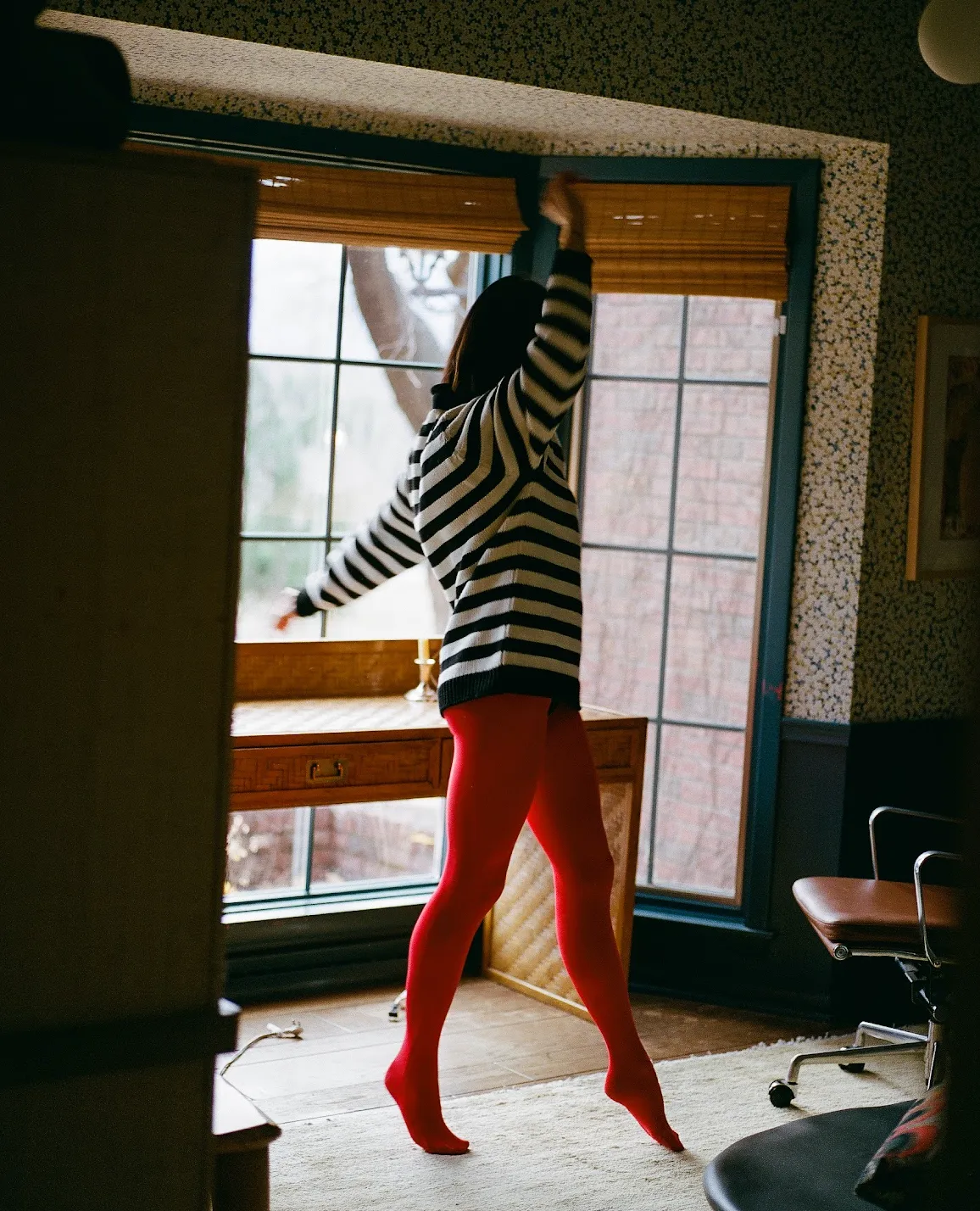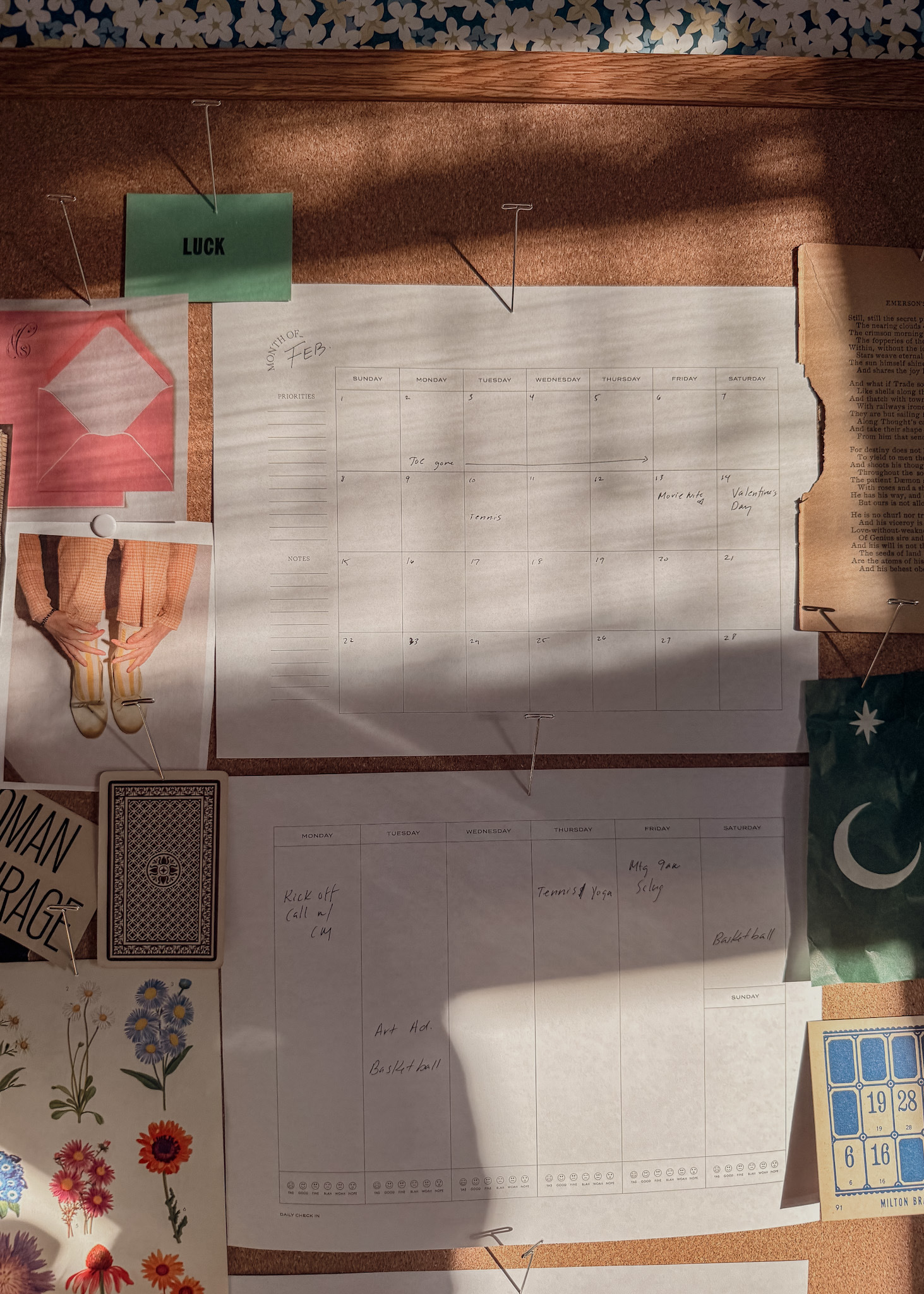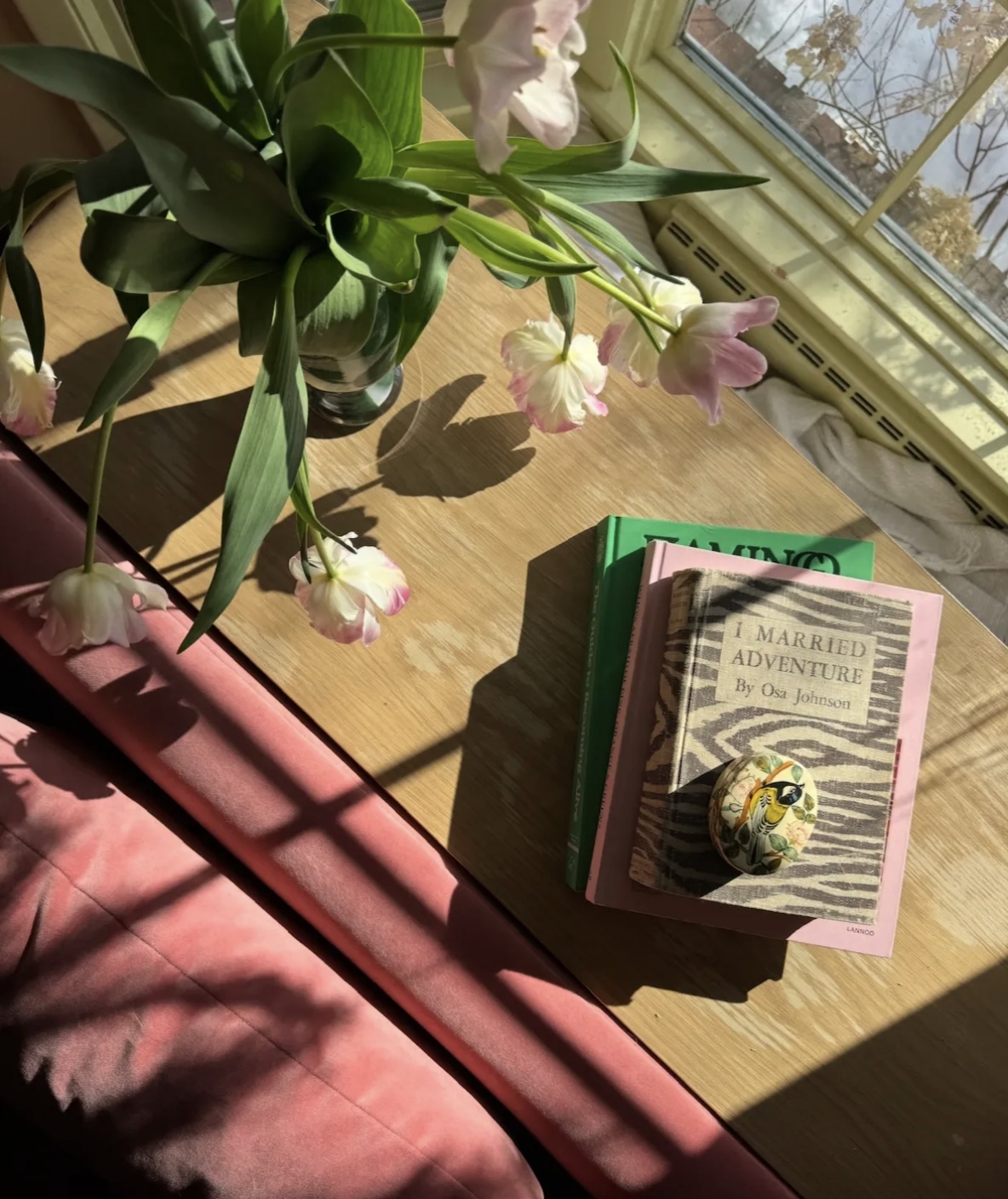

Greetings from the part of Wyoming that doesn’t show up on the front of many postcards. Here, the sky swallows up the dusty earth, pyrotechnics are a religion, and a job at the nearest oil rig will afford locals with the stuff this particular space tells them matters: a dog, a couple of guns, booze, a regularly unreliable pick-up, greasy drive-thru dinners. It’s a place that swivels on a razor’s edge—at once incomprehensibly pretty, despite all it lacks compared to its big, showy sisters like Jackson and Yellowstone, but, too, it is bitter, severe, and hard to look square in the face.
It’s a place that is as much me as the cartilage resting between my bones and, with the exception of one human being, a spot I’d swear to never return.
Yet, here I am, sitting in the lobby of a Holiday Inn with an enormous oil platform sculpture as my backdrop. I’m here because exactly one year prior, to the day, I lost that one exceptional human being, and because of a little thing called COVID (perhaps you’ve heard of it), my people have been unable to gather and memorialize him. Until now.
The thing you may need to know about this particular person is that he was my pops, my rising sun, my favorite story, in the history of stories. He didn’t have much (nor did he want it), but he lived the sort of life, with the sort of tales, filmmakers, writers, and patrons at the local cafe would clamor for. And no one clamored more than yours truly.
Watching him grow older and slower, I started bracing myself for our eventual parting. I began narrating, in my brain and in my heart, the conclusion to his story. To our story.
For over half a century, this guy would go, along with his horse, Rusty, and faithful packing mule, Suitcase (yes, please take a brief moment to appreciate the name, thank you), into the mountains, cell phone-less, compass-less, WiFi-less, and spend days, sometimes weeks out there with the sharp rocks and sagebrush. So, of course, the protagonist in this nonfiction masterpiece would, on some unmarked date, go up there for weeks, which would turn into months, which would turn into forever and it would be the not knowing when or how or what happened that would devour the rest of us whole. We’d be left explanation-less, but this was the only foreseeable and perfect enough end scene.
Instead, the same week the world saw the video of a man being murdered for a plump and infinite nine minutes and twenty-nine seconds before cracking wide open with an upright rage, we found out my pops was ripe with cancer. I listened hard and still over the racket of helicopters and sirens, scribbling on the back of a crumpled junk mail envelope: “liver, pancreas, kidney, etc.” He was caked in the stuff.
My husband and I, armed with masks and a heavy supply of sanitizer, hopped on a plane to say some semblance of goodbye, or whatever we could muster. Instead of wondering what sort of rugged cowboy shenanigans he had gotten himself into, I spent twenty minutes opening up packages of flannel sheets under the florescent lighting of a local Walmart in a heated contest to uncover the softest ones to place on his hospice bed, we watched the hue of his skin turn the color of iodine, and I held onto him, big spoon-like, as I begged into the bowl between his shoulders not to leave—which, only two days later, morphed into me silently begging him to go ahead and get himself the hell out of the torment.
Two weeks after his diagnosis, he was gone. This ending had no mercy, no dignity, no forgiveness.
I’ve spent every one of the last 365 days gator wrestling with this maniac called grief. . . I’ve been afraid to return to Wyoming. I’ve been afraid to see it all puckered up and pitiful without the one cowboy capable of making it enchanting.
So, needless to say, I’ve spent every one of the last 365 days at a world war with this maniac called grief; currently bookmarked at the spot where I’m worried I won’t be able to memorize the lazy lollygag in his voice. I’ve been afraid to return to Wyoming. I’ve been afraid to see it all puckered up and pitiful without the one cowboy capable of making it enchanting. Afraid of hoping for a closure I know a ceremony, a drive in the mountains, the smell of horse saddles, the booth at the feed store where he drank chamomile tea with honey, could never afford. It’s been easy to hold tight to a grudge toward a global pandemic for boxing us out of a tribute, for keeping us from putting the final piece of punctuation on this particular story—a story I’ll quite honestly never be able to put down.
Which made me ask a lot of questions about closure. Should I be looking for it at all? Is it a thing we ever really get? Why do we crave it so badly? Is it ours to give ourselves? I, in my totally stable way, became infatuated with our collective obsessive scurry for closure—at the end of a relationship, the loss of a job, the letting go of a life. I, again, in my totally stable way, decided to ask a pro to weigh in. No, not Google. My therapist. Her name is Heather Klein (though, she doesn’t seem to mind when I call her Doc Klein) and she is an actual living, breathing earth angel. She is also very smart and doctorate-ed in topics like grief and loss and, therefore, our sensei for this piece’s need to uncover our love affair with the notion of closure.
She agreed, despite me ghosting her for the better part of those life-altering aforementioned days when I was unable to put words to the fracture in my heart, to answer some of my burning questions. Here’s what she had to say:
From a psychological or medical standpoint, how is closure defined? Is there a definition?
The American Psychological Association (APA) defines closure as:
(n.) The act, achievement, or sense of completing or resolving something. In psychotherapy, for example, a client achieves closure with the recognition that he or she has reached a resolution to a particular psychological issue or relationship problem.
Why do humans crave closure?
As humans, we often want to feel as if things are complete. It is often anxiety-producing to have something in limbo or unresolved. In general, we do not like “not knowing” and uncertainty. We seek to resolve situations and we favor certainty and predictability.
So far as we know, are humans the only animals that crave closure?
I’m fairly certain that is the case. We are the only species capable of articulating our complex cognitive and emotional experiences. We have observed grief in other animals, however. Other animals are capable of attachment and we have observed them feeling despair when one of their attachment figures is no longer present in their lives.
Do rituals or ceremonies we commonly hold to bring a sense of closure (say, a funeral) help? Is there a cognitive reason for this?
Rituals absolutely can help with the meaning making around grief and loss. Cognitively as well as emotionally and spiritually, meaning making helps contextualize and expand experiences so that we understand them more fully and can link them to our narratives. Whether a specific ritual brings a sense of meaning depends on each individual. Again, I think humans desire to have an experience of completing something.
I think it is important to note that I believe that grief can be a very complex experience. Some grief/loss may surface throughout our lives. There can be an overall acceptance of the loss, and it can still bring us moments of despair, sadness, frustration, anger, etc. If we can remember people and events fondly and with love, we can also bring to mind and heart the sadness of the loss. With some rituals, people look forward to being reunited with their loved ones and/or believe their loved ones are still present. For those who make meaning of death/loss in these types of ways, the hopefulness and anticipation can often be comforting and facilitate acceptance.
Does the need for closure exist on a scale? Meaning, do some people seek it out more than others? Are there factors at play as to why someone (or a personality type) may seek closure as opposed to another?
People do differ in their wants, needs, and desires around seeking resolution. People also differ in their levels of insight into their wants, needs, and desires. I think societal and cultural narratives around grief and loss come into play also. People are often guided behaviorally, emotionally, cognitively, and spiritually by societal and cultural norms. For example, you will often hear people say things like, “I should be over this by now.” Yet what is truly dictating the timeframe? Are they imposing pressure on themselves or is pressure being imposed externally by others and/or societal and cultural norms? People who can tolerate “not knowing” and who allow themselves open-ended time to make meaning and work toward acceptance will most likely fair better than those who reach “acceptance” forcefully and prematurely.
Can feeling like you have closure (or not) impact common mental health hardships many people grapple with, like anxiety or depression?
I definitely believe so. Factors such as pre-existing mental health concerns, predisposition for mental health problems, how close the person was to the other person, how interwoven their lives were, and how complicated the grief process is, will influence how a person experiences the mental health effects of loss. Persons with pre-existing anxiety and/or depression will often have their symptoms exacerbated. Grief can also bring about episodes of anxiety and/or depression in and of itself.
Are there any specific therapies that help people gain closure? What do some of those look like? How effective are they?
I think first and foremost the strength of the relationship between a therapist and client facilitates the work needing to be done more than any one “type” of therapy. A therapist needs to be able to meet the client where they are at as well as provide a safe place for the client to explore and make meaning of their grief and loss. I believe a lot of therapies could be helpful in this process. I personally gravitate toward narrative therapy, compassion-based therapy, interpersonal therapy, CBT, and family systems. The effectiveness of any therapy has so many factors—some include: the therapeutic relationship, motivation, insight, stages of change, implementation of therapeutic ideas and solutions outside of session, and so much more.
I see grief as a process that can open back up during different times in our lives. If we can look at those openings as invitations to make further meaning and to explore our personal narratives as well as our relational narratives, closure is actually not something we need to “achieve.”
Do you really ever get closure?
I think that is a really good question. Again, I see grief as a process that can open back up during different times in our lives. If we can look at those openings as invitations to make further meaning and to explore our personal narratives as well as our relational narratives, closure is actually not something we need to “achieve.” We can afford ourselves grace and time to make meaning and to leave space for that meaning to shift and change over time.
So, there you have it. It is yet to be determined if a jostling drive up through the Wind River Mountain Range, where we will bury handwritten letters and Cinnamon Fire Jolly Ranchers (a shirt pocket signature of his) next to his ashes will hush my sandbagged heart. I have a sneaky feeling I may not “achieve” closure by the deadline I had unintentionally given myself, like I wish were totally a thing. But having this time with my pops, and the other two leading men in my life (my husband and my son, who has the same colossally kind heart and adventurous spirit as the guy who came before him) seems like a good and necessary start.


April (Swinson) Smasal spent her formative years in Wyoming, where her career options were limited to rodeo queen or writer. Foregoing the lure of an impressive belt buckle collection, she opted for the word thing. Now, she’s a copywriter and writer-writer living in St. Paul, Minnesota with her husband, Nick, baby boy, Hank Danger and very cute-slash-spoiled French Bulldog, Arnold E. Biscuits.
BY April (Swinson) Smasal - June 22, 2021
Most-read posts:
Did you know W&D now has a resource library of Printable Art, Templates, Freebies, and more?
take me there
Get Our Best W&D Resources
for designing a life well-lived




Thank you for being here. For being open to enjoying life’s simple pleasures and looking inward to understand yourself, your neighbors, and your fellow humans! I’m looking forward to chatting with you.
Hi, I'm Kate. Welcome to my happy place.


















Thank you for this. I’m so sorry for your loss.
Thank you for reading, Jody! And thanks, too, for your kind note.
Wonderfully written. I can feel the depth of your emotion. Thanks for sharing. My condolences.
That means so much, Nicole, thank you.
So heartfelt and powerful! Thank you for sharing this.
Thank you for reading and taking the time to leave such a kind note, Alisa! Really appreciate it.
Things come to us when we need it. This beautifully written piece was a balm (although temporary) to my grieving heart. I lost my “pops” in March after being his caretaker for 2 1/2 years. I had all of my shit together, focused on being there for him, which turned into planning a loving funeral and closing out all of his business. All the while remaining calm and at peace until things slowly started to unhinge but not really knowing what was going on about a week ago. Then Father’s Day hit and the floodgates opened!! Oh my goodness, this… Read more »
Ohh, Sheri, I am so sorry for your loss. What a beautiful and, I imagine, tough thing to be the caretaker for the last of his precious time here. I think what Doc Klein had to say must be true, that it’ll likely open up at a different times—sometimes when we expect it, other times not so much. In some weird way, it actually makes things a little easier for me to know that I’m not the only one in this boat, lonely as it seems at points. So, thank you so, so much for your note. I hope your… Read more »
This was such a beautiful read. Thank you for sharing your heart & the gift of these words with us. So sorry for your loss. ♥️
Thank you so much for reading and taking the time to comment, Taylor! Means a lot.
My dad passed away 15 years ago and then just 26 months later my husband died suddenly. I’ve learned to live with the grief and I know I’m a better person today because of what I’ve been through.
Thank you April, for sharing your pain. You have been given the gift of helping others on this difficult path.
April thank you so much for sharing your story. This past year has been hallmarked by so much loss for so many people, and I appreciate you exploring it through writing. I’ve been doing the same as I figure out divorce and cancer amidst covid and new rules for how to be together apart. Maybe you’ll read some of my work and see we’re not alone. https://www.anothermillennialincrisis.com/